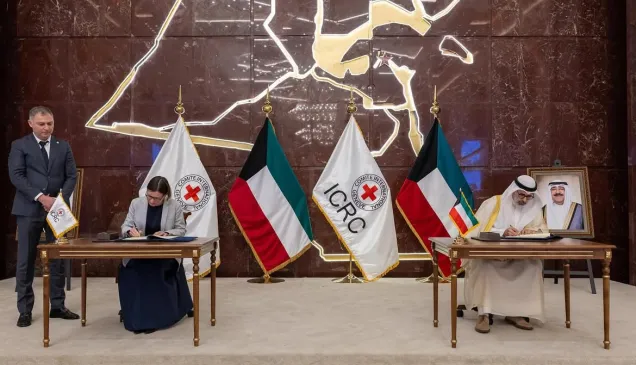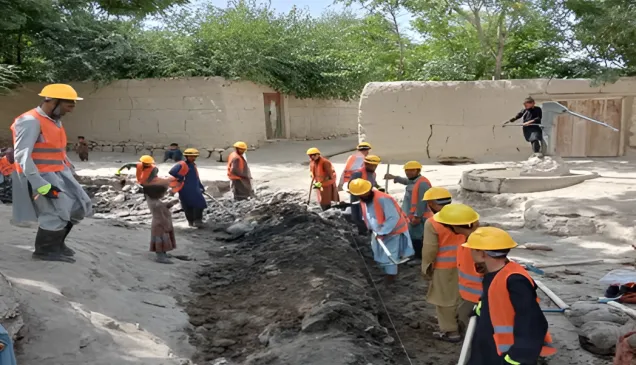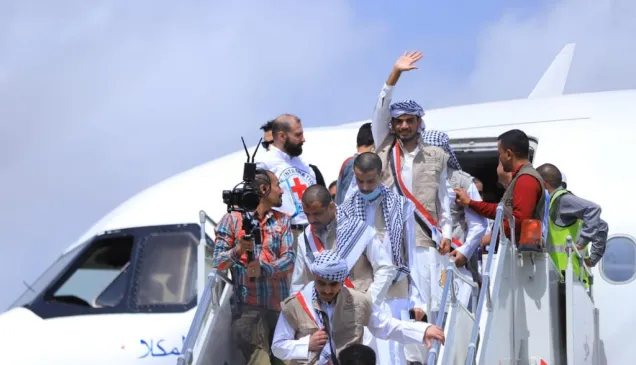Nuclear weapons must never again be used and must be eliminated through adherence of all States to the Treaty on the Prohibition of Nuclear Weapons and the fulfillment of solemn obligations under the Nuclear Nonproliferation Treaty including urgent measures to reduce the risk of nuclear weapon use. Any use of nuclear weapons would result in catastrophic humanitarian consequences for which no adequate national or international assistance capacity exists. The use of such weapons would be unacceptable in humanitarian, moral and legal terms and must be prevented.
These sentiments reflect the essence of two days of discussion and engagement with experts by leaders and senior staff of 17 National Red Cross and Red Crescent Societies from Afghanistan, Algeria, Azerbaijan, Ethiopia, France, Georgia, Iran, Jordan, Kuwait, Kyrgyzstan, Lebanon, Norway, Qatar, South Sudan, Tajikistan, Turkmenistan and Yemen. Representatives of the International Federation of Red Cross and Red Crescent Societies and the Arab Red Crescent and Red Cross Organization also attended the workshop co-hosted by the Qatar Red Crescent and International Committee of the Red Cross.
Participants in the Doha workshop recommitted their National Societies to active implementation in their national contexts of the Action Plan 2018-2021 "Towards the Elimination of Nuclear Weapons" adopted by the global International Red Cross and Red Crescent Movement in Antalya in November 2017. The work in Doha focused, in particular, on the strategies and resources needed to engage governmental authorities in States that have supported the Treaty on the Prohibition of Nuclear Weapons (TPNW) politically but have not yet signed or ratified it - with a view to promoting their adherence in the coming months.
Some of the key challenges identified by participants include:
• A lack of awareness among the public, media and even decision-makers about the urgent implications of the nuclear weapon threat for all populations.
• Lack of awareness even among decision-makers of the content, purpose and provisions of the TPNW.
• Substantial and artificial obstacles presented by opponents of the TPNW intended to discourage adherence by additional States.
• Even when a State is positive towards the TPNW it may face a range of competing priorities for attention on governmental and parliamentary agendas.
• Some relevant Ministries such as those responsible for health and the environment may not be consulted, with decision-making remaining within foreign affairs and security policy circles.
Yet, in face of these challenges, participants identified and committed themselves to undertaking a range of measures involving the public, parliamentarians and government authorities including:
• Engaging with National Society hierarchies and relevant ICRC delegations to develop national strategies and action plans appropriate to the local context.
• Employing the wide range of ICRC public communication and expert advocacy materials that are now available as well as those forthcoming as part of ICRC's web-based campaign to be launched by January 2019 (including adaptation of resources for local contexts and into local languages).
• Adapt appropriate communication materials to target specific audiences including youth.
• Hosting, with ICRC support, national roundtables involving key decision-makers from government, parliament and other organizations to frame the national discussion in humanitarian and IHL terms, present the Movement position and invite a positive response from authorities.
• Engage National Society leaders and board members who are also members of parliament to raise signature and ratification of the TPNW in relevant committees of parliament.
• Joint meetings between National Society leaders and heads of ICRC delegations with key national decisions makers.
• Send letters in support of TPNW signature and ratification to key ministers, either bilaterally or jointly with a group of National Societies from the same region or context.
• Ensure National Society focal points are regularly updated on new resources and developments via the Movement Support Group and the ICRC's new online platform on implementation of the Movement Strategy 2018-2021.
Participants welcome and are encouraged by the determined international mobilization culminating in the adoption of the Treaty on the Prohibition of Nuclear Weapons by 122 States in 2017, its signature by 69 countries and its ratification by 19 others. This followed appeals to States for such action by the global Red Cross and Crescent Movement in 2011 and 2013. Participants recognized that the work ahead is no longer in international negotiations but in affecting the hearts and minds of our members, populations and politicians and in engaging with the decision-making processes occurring in national capitals.
Humanity is at a turning point in which the risks of nuclear weapon use have increased significantly and vast resources are to be spent in "modernizing" nuclear arsenals. Yet with the mobilization of States, civil society and the Red Cross and Crescent Movement and the adoption of the Treaty on the Prohibition of Nuclear Weapons we now have, for the first time in the nuclear age, the tool needed to create a safer future for our children and grandchildren, a future free of the threat of catastrophic destruction that nuclear weapons entail.
Participating National Societies see the non-use, prohibition and elimination of nuclear weapons as a humanitarian imperative. They will work tirelessly within the framework of the Movement Action Plan 2018-2021 and strategies identified at the Doha workshop to help ensure their States' adherence to the Treaty on the Prohibition of Nuclear Weapons and active participation in other global efforts to bring the era of nuclear weapons to an end.



